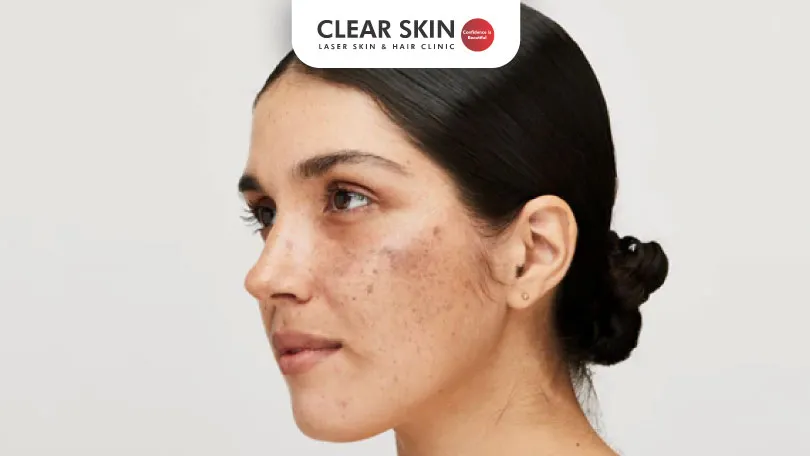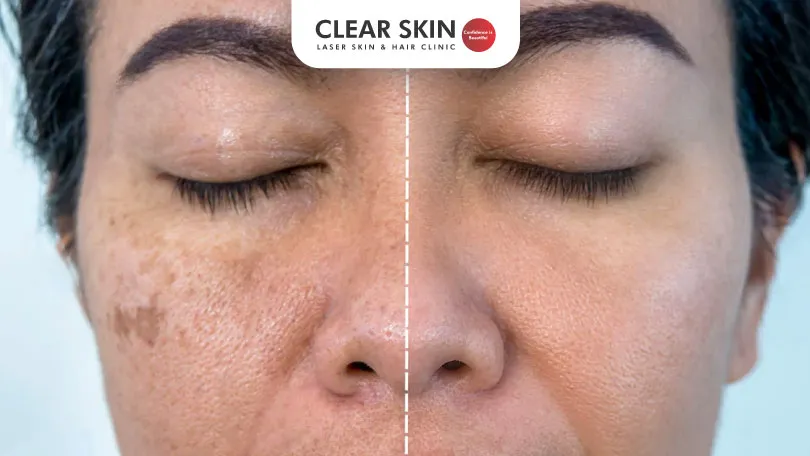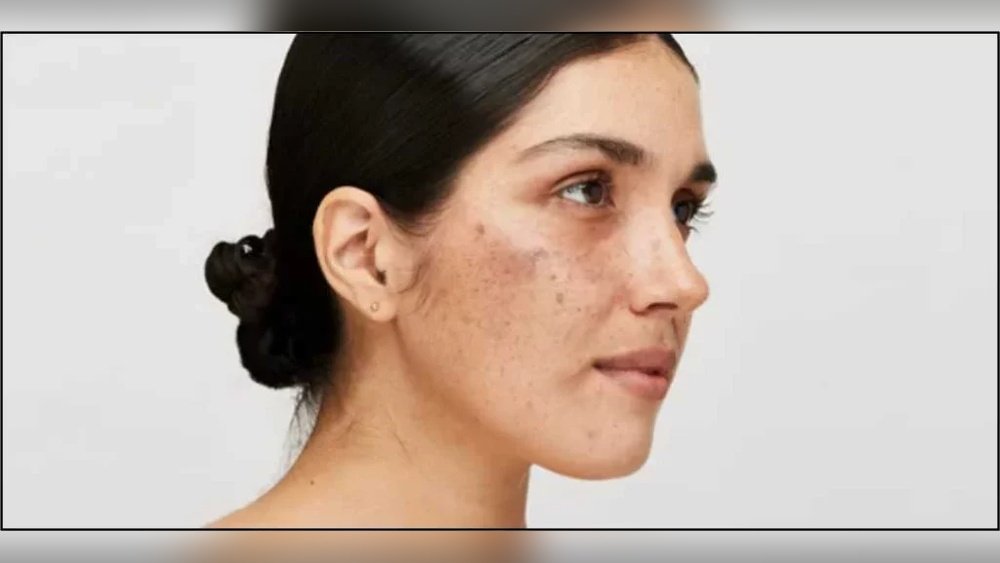Have you noticed your face looking dull, tired, or lackluster lately? It might be more than just fatigue or stress.
Sometimes, the real culprit hiding beneath the surface is a vitamin deficiency. Your skin is a clear reflection of what’s happening inside your body, and when certain vitamins are missing, your face can lose its natural glow. But which vitamins are responsible, and how exactly does their absence cause that dull, uneven complexion?
You’ll discover the key vitamins your skin needs, how their deficiency affects your face, and what simple steps you can take to bring back your radiant look. Keep reading—your skin will thank you!

Credit: www.clearskin.in
Vitamins Impacting Skin Glow
Vitamins play a crucial role in maintaining healthy and glowing skin. A lack of certain vitamins can cause the skin to look dull and tired. These essential nutrients help repair skin cells, boost collagen production, and protect against damage. Understanding which vitamins impact skin glow can help improve your complexion naturally.
Role Of Vitamin C
Vitamin C is vital for bright and radiant skin. It helps produce collagen, a protein that keeps skin firm and smooth. Without enough vitamin C, skin can become dry and dull. This vitamin also fights free radicals that cause skin damage. A deficiency may slow healing and increase skin discoloration.
Vitamin A And Skin Health
Vitamin A supports skin cell growth and repair. It helps keep skin soft and prevents dryness. Low levels of vitamin A can cause rough, flaky skin and acne. This vitamin also promotes a clear complexion by reducing inflammation. It is important for maintaining an even skin tone.
Importance Of B Complex Vitamins
B complex vitamins improve skin health by supporting cell metabolism. Vitamins B2, B3, and B7 help reduce redness and inflammation. Deficiencies can cause pale or yellowish skin and mouth sores. These vitamins also aid in maintaining moisture and skin barrier function. A good supply of B vitamins keeps skin vibrant and healthy.

Credit: omegaquant.com
Signs Of Vitamin Deficiency On Face
Vitamin deficiency often shows clear signs on the face. These signs can help identify underlying health issues early. The face may look dull, tired, or unhealthy without enough essential vitamins. Recognizing these symptoms can guide you to seek proper care and improve your skin’s appearance.
Pale Or Yellowish Skin
Pale skin can result from a lack of vitamin B12 or iron. These nutrients help produce red blood cells. When their levels drop, the skin loses its healthy color and appears pale or yellowish. This change is a common and visible sign of deficiency.
Glossitis And Mouth Sores
Glossitis means the tongue becomes red, swollen, and sore. It often happens with low levels of vitamin B2, B3, or B12. Mouth sores or ulcers may also appear on the gums or tongue. These symptoms make eating and speaking uncomfortable.
Angular Cheilitis
Angular cheilitis causes painful cracks at the corners of the mouth. It often occurs due to a lack of iron, vitamin B2, or B6. The cracks can become red, swollen, and sometimes bleed. This condition affects both appearance and comfort.
Common Skin Rashes From Deficiency
Vitamin deficiencies can cause several skin problems, including rashes. These rashes often appear as redness, scaling, or inflammation. They may make the face look dull and unhealthy. Identifying the cause helps to restore skin health quickly.
Vitamin B3 And Skin Rashes
Vitamin B3, also called niacin, is vital for skin health. A lack of it can cause a condition called pellagra. Pellagra leads to red, scaly rashes on sun-exposed skin areas. These rashes may itch or burn and can spread if untreated. Pellagra also causes dryness and rough skin texture.
Effects Of Zinc And Vitamin D
Zinc supports skin healing and immune function. Without enough zinc, skin can become inflamed and develop rashes. These rashes may appear as red patches or small bumps. Vitamin D deficiency also affects skin. It can cause dryness and worsen eczema. Low vitamin D may slow down skin repair and increase sensitivity.
Vitamin C Deficiency And Skin Lesions
Vitamin C is crucial for collagen production, which keeps skin firm. Deficiency causes scurvy, leading to skin lesions and bruising. The skin may develop small red or purple spots called petechiae. These spots appear due to weak blood vessels. Dry, rough, and scaly skin is also common with low vitamin C levels.

Credit: www.clearskin.in
How Deficiency Slows Skin Repair
Vitamin deficiency can slow down the skin’s natural repair process. The skin needs vitamins to heal wounds and renew itself. Without enough vitamins, the skin becomes weak and dull. This delay affects how the skin looks and feels every day.
Delayed Scar Healing
Scar healing depends on vitamins like C and A. Vitamin C helps the body make collagen, a protein that repairs skin. Without enough vitamin C, scars take longer to heal. The skin stays damaged and rough for more time. Vitamin A also supports skin cell growth. A lack of vitamin A means slower skin renewal. This delay causes scars to remain visible longer.
Uneven Skin Tone Development
Vitamin deficiencies can cause uneven skin color. Vitamin B complex and vitamin C help keep skin tone balanced. Without these vitamins, the skin may develop dark spots or patches. The skin loses its natural glow and looks dull. Uneven skin tone makes the face appear tired and unhealthy. Proper vitamin levels support smooth and bright skin.
Testing And Diagnosing Deficiencies
Testing and diagnosing vitamin deficiencies is essential for understanding the cause of a dull face. A dull complexion often signals underlying health issues, including lack of vital nutrients. Early diagnosis helps guide proper treatment and skin care strategies.
Doctors use various methods to identify specific vitamin shortages. These tests reveal which vitamins your body lacks. Accurate diagnosis ensures the right supplements or dietary changes can restore skin health and brightness.
When To See A Doctor
Persistent dullness in the face may indicate vitamin deficiency. Seek medical advice if skin appears pale, dry, or uneven for weeks. Other symptoms like mouth sores or a swollen tongue also require attention. A healthcare professional can assess overall health and recommend tests.
Common Diagnostic Tests
Blood tests are the most common way to detect vitamin deficiencies. Tests measure levels of vitamins such as B12, D, and C. Some doctors may check iron and zinc levels too. These tests provide clear evidence of nutrient gaps. Skin biopsies are rare but sometimes used for detailed analysis.
Boosting Skin Health With Nutrition
Healthy skin starts from within. Proper nutrition provides the skin with vitamins and minerals it needs. These nutrients help repair damage and keep skin glowing. Deficiency in key vitamins can lead to a dull face and uneven skin tone. Eating a balanced diet supports skin health and boosts its natural radiance.
Along with diet, supplements and lifestyle habits also play a role. Combining these approaches can improve skin texture and brightness. Understanding which vitamins matter most helps create an effective skin care plan.
Dietary Sources Of Essential Vitamins
Vitamin C is found in citrus fruits, strawberries, and bell peppers. It helps build collagen and fight free radicals. Vitamin A comes from carrots, sweet potatoes, and leafy greens. This vitamin supports skin cell growth and repair. Vitamin E is present in nuts, seeds, and spinach. It protects skin from oxidative damage.
B vitamins like B3 and B7 are in eggs, whole grains, and legumes. They improve skin hydration and reduce inflammation. Iron-rich foods such as red meat and beans help maintain healthy blood flow to the skin. Eating a variety of these foods ensures your skin gets essential nutrients.
Supplement Options For Skin Glow
Supplements can fill gaps when diet falls short. Vitamin C tablets boost collagen and brighten skin. Vitamin D pills support skin barrier function and repair. Fish oil capsules supply omega-3 fatty acids, reducing dryness and redness. Biotin supplements promote skin strength and elasticity.
Always choose supplements from trusted brands. Consult a healthcare provider before starting any new supplement. Proper dosing avoids side effects and ensures maximum benefit. Combining supplements with a healthy diet yields better results for glowing skin.
Lifestyle Tips For Radiant Skin
Drink plenty of water to keep skin hydrated. Avoid smoking, which damages skin cells and causes dullness. Get enough sleep to support skin regeneration. Manage stress through relaxation techniques to prevent flare-ups and dullness. Protect skin from sun exposure by wearing sunscreen daily.
Regular gentle cleansing removes dirt and dead cells. Exercise improves blood flow and oxygen delivery to the skin. These simple habits enhance nutrient absorption and skin renewal. A consistent routine helps maintain a vibrant, healthy complexion.
Frequently Asked Questions
Which Vitamin Deficiency Causes Dull Face?
Vitamin C deficiency causes a dull face by making skin look uneven, dull, and slowing scar recovery.
What Are The Facial Signs Of B12 Deficiency?
Facial signs of B12 deficiency include pale or yellowish skin, a red swollen tongue, mouth sores, and cracked mouth corners.
Which Vitamin Is Good For A Dull Face?
Vitamin C is excellent for brightening a dull face. It boosts collagen, evens skin tone, and promotes radiance.
Can A Vitamin Deficiency Cause A Rash?
Yes, vitamin deficiencies like B3, C, A, D, and zinc can cause skin rashes, dryness, or inflammation. Consult a doctor for diagnosis and treatment.
Conclusion
Vitamin deficiencies can dull your face and affect skin health. Lack of vitamins like C, A, and B complex reduces skin glow and healing. Deficiencies may cause pale skin, sores, or inflammation. Eating a balanced diet supports vibrant, healthy skin.
Consult a healthcare provider if symptoms persist or worsen. Simple vitamin care can improve your skin’s appearance naturally. Healthy skin starts with proper nutrition every day.
 Skip to content
Skip to content 